Adding, Editing, Deleting & Printing Sales Return in Ginesys Web
The Sales Return is raised by the seller in Outright mode after returning goods from customer's site with or without reference document (Sales Invoice) sent by the seller. The Invoice bears all the details of the goods return from the store. The Sales Return affects both the Inventory stock as well as Financial part. This article describes the process of managing Sales Return in Ginesys Web module.
Prerequisites
- The users' role must have access to the Add app operation in the Sales Return feature in Sales & Distribution - Operation - Invoicing through Roles in Ginesys Web - Admin - Security.
- Document Numbering Scheme must be present for the module.
- The masters must be present - Item, Customer, Term etc.
Step-by-step guide
- Go to Ginesys Web > Sales and Distribution > Operations > Invoicing > Sales Return.
- Sales Return module will open.
- All the previously created Sales Return will be listed here.
- Click on Add button.
- Sales Return window will open.
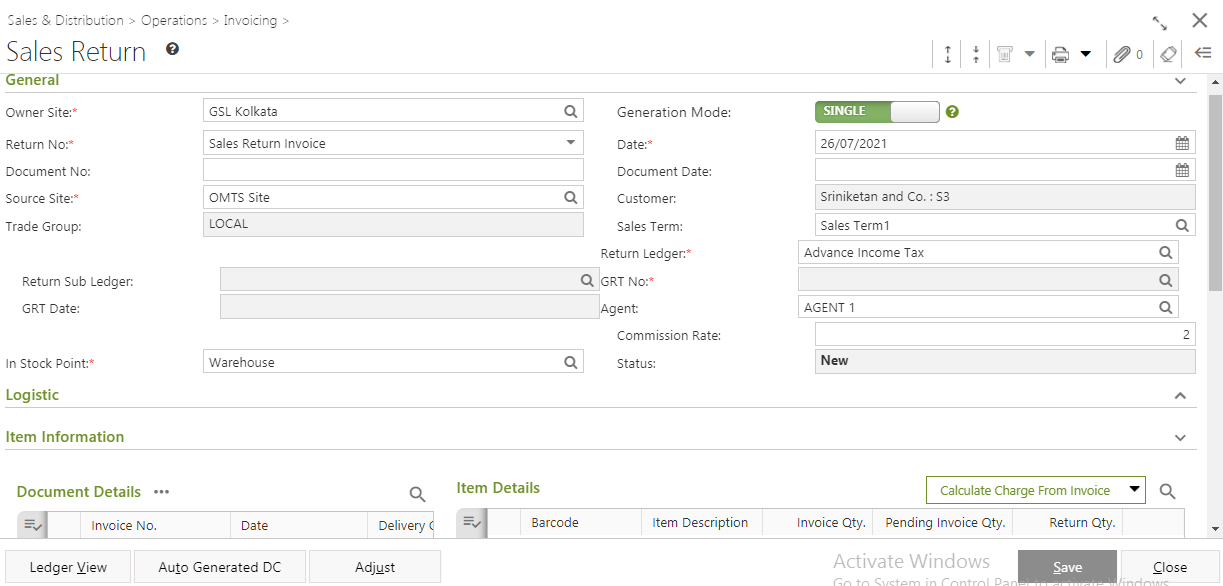
- You will get group of icons at the top right corner of the window.

The icons name from left to right are - Expand All, Collapse All, Print Document Report, Attachments, Clear Form and Open Side Panel.Expand All: Clicking on this icon, all the sections will be Expand if they are collapsed.
Collapse All: Clicking on this icon, all the sections will be Closed if they are expanded.
- Print Document Report: Clicking on the Down Arrow beside this icon, you will get Print Preference option with already created Report File Template. This option is used to print document.
- Attachments: You can Upload some required documents from this option.
- Clear Form: Clicking on this icon, you can Clear all the data already entered.
- Open Side Panel: Clicking on this, you will get the details of the current Transfer In as follows:
- Document Summary: In this section you will get the details of Selected Items, Sale Type, Owner Site, Modified byetc.
- Customer Details: You will get the Selected Customer Details like Address, Contact Details, Tax Region, Credit Limit, Overdue Amount etc.
- Customer Statistic: This section describes the Delivered not Invoiced amount, Outstanding Amount, Last Invoice Date etc. You will get six sections - General, Transfer Out Details, Logistic Information, Item Information and Others.
- You will get six sections - General, Logistic Information, Item Information and Others.
- General:
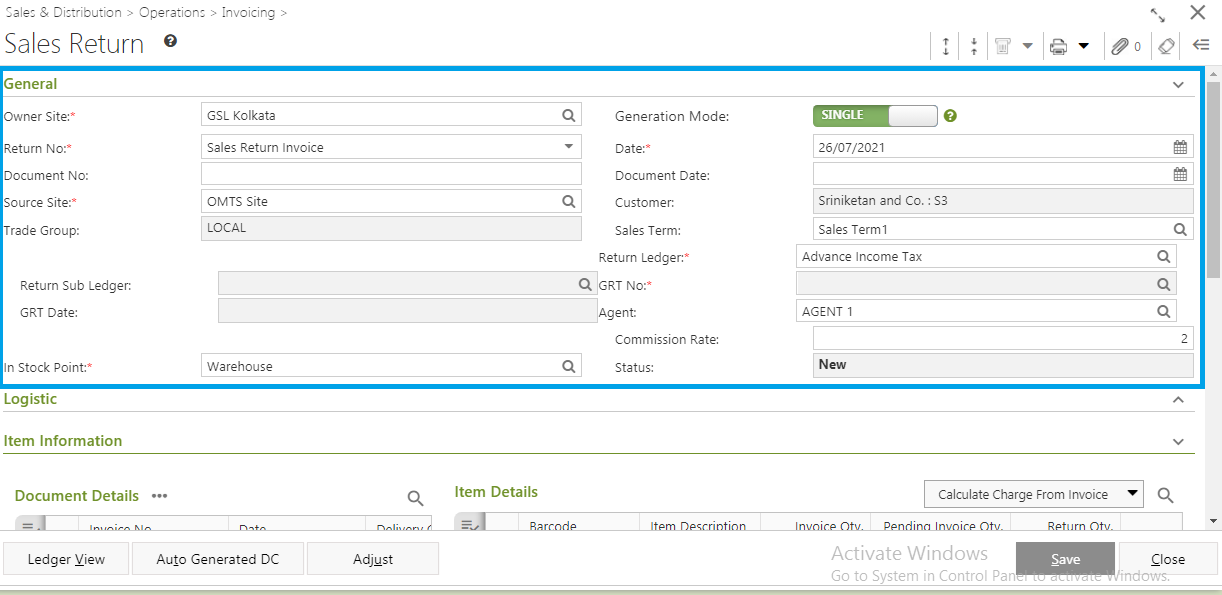
- Select the Owner Site (Mandatory Field) for which you want to create the Sales Return (Owner Site wise General Ledger selection is applicable).
- Select Return No. from the drop down list (Mandatory Field).
- Select the Source Site (Mandatory Field)from the Source Site Pop-Up form. Customer, Sales Term, Trade Group, Commission Rate will be populated based on Source Site.
Return Ledger, Transit Ledger, Agent, Customer etc will be populated as per Source Site selection. You can change the Transfer In Ledger, Agent and Transfer In Sub Ledger.
Generation Mode has two option Single & Multiple.
Status will be populated automatically.
Mandatory Information
Source Site, Return Ledger, GRT No., Date and In Stock Point are all mandatory fields and need to be specified before any other segment is approached.
- System date will be populated in the Date field (Mandatory Field). You can change the date as per your requirement. You can only select the past date from the system date but not any future date.
- Logistic Details: Logistic Details will be populated according to the selection of Source Site. Gate Entry No. is the mandatory field.
- Item information:
- You will get two sections in the Item Information section - Document Detail and Item Details.
- Items can be selected only through Add Items window for Managed Site.
- All the packets of selected GRT will be populated. You can populate all the packet together.
- Items of the selected GRT No. can be selected through Scan Item, Select Item, and Import
Barcode from the menu of Add Item window. - You can populate packets and selected items together.
- You can select the Invoice Resolution Option as - FIFO, LIFO or Do Not Resolve. According to that the items and packets will be populated.
- Items can be selected through Specific Invoice, Set off Invoice and Import File for Unmanaged Site.
- Specific Invoice:
- Click on the Specific Invoice option.
- Specific Invoice window will open.
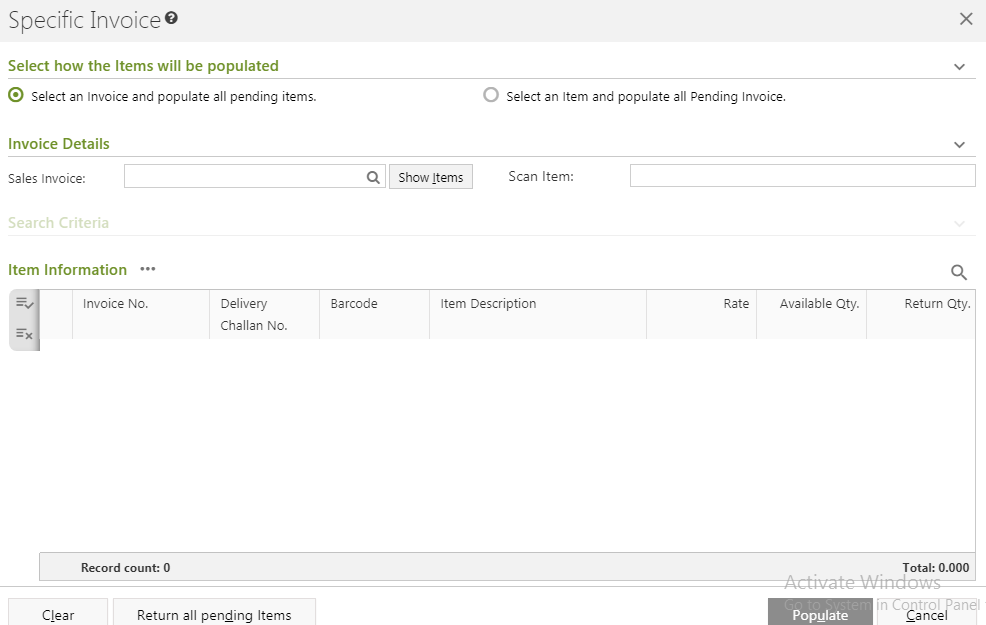
- You will get two radio button under Select how the Items will be populated - Select an Invoice and populate all pending items and Select an Item and populate all Pending Invoice.
- Select an Invoice and populate all pending items:
- You will get Sales Invoice and Scan Item fields to search pending invoices and items present in the pending invoice. Invoice selection is mandatory.
- Click on the Show Items button.
- All the items will be populated in the item information section according to the search criteria.
- You can manually put the return quantity. You can also click on the Return all pending Items.
- Click on the Populate button.
- All the listed items and the invoices will be populated in the Item Details section.
- You will get Sales Invoice and Scan Item fields to search pending invoices and items present in the pending invoice. Invoice selection is mandatory.
- Select an Invoice and populate all pending items:
- Setoff Invoice:
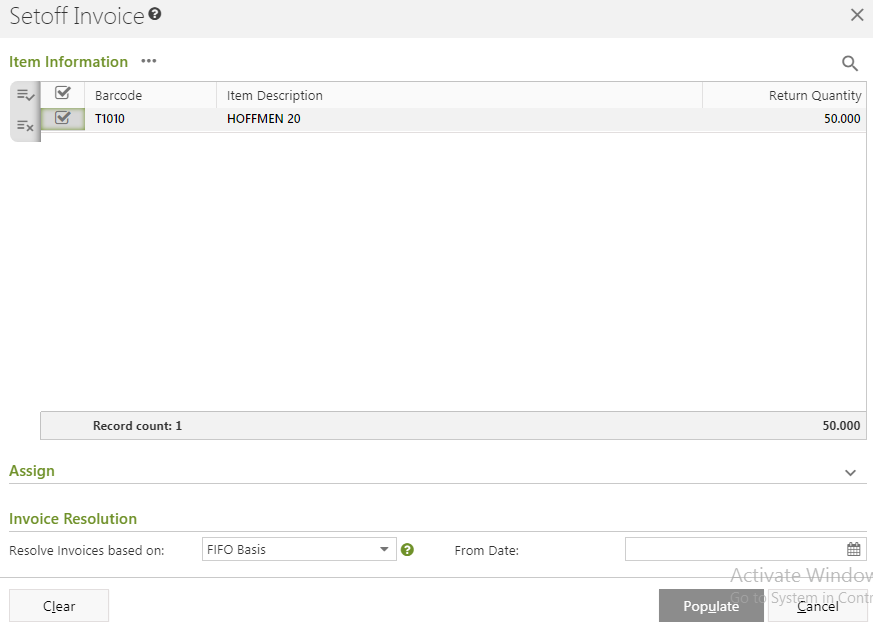
- Click on the Setoff Invoice option.
- Setoff Invoice window will open.
- Items can be selected through Select Item, Scan Item, and Import Barcode.
- Selected Items will be populated in the Item Information section.
- You can put the quantity for return in the Assign Quantity field.
Selected Items can be setoff against available invoices, provided FIFO/LIFO, is selected as setoff basis. In case no invoice found, or quantity is more than available
invoice quantity, items to be populated as Adhoc with the surplus quantity. If resolution basis is chosen as FIFO, then From Date can be provided optionally. If provided, then invoice between From Data and Return Date to be setoff. If resolution basis is chosen as LIFO, then Till Date can be provided optionally. If provided, then invoice between Till Date and Return Date to be setoff.- Do not Resolve Invoices: In this option you will get list of all the items.
- Resolve Invoices based upon FIFO(if applicable): In this option you will get those items which are present in the invoices from a particular date you provided in First In First Out (FIFO) manner. You will get From Date field in the FIFO mode. You cannot select the date more than system date. The system will search the invoices created between the provided From Date and the Sales Return Document Date.
- Resolve Invoices based upon LIFO(if applicable): In this option you will get those items which are present in the invoices up to a particular date you provided in Last In First Out (LIFO) manner. You will get Till Date field in the LIFO mode. You cannot select the date more than system date. The system will search the invoices created between the provided Sales Return Document Date and Till Date.
- Do not Resolve Invoices: In this option you will get list of all the items.
- The selected items will be populated in the Item Details section.
- Import File:
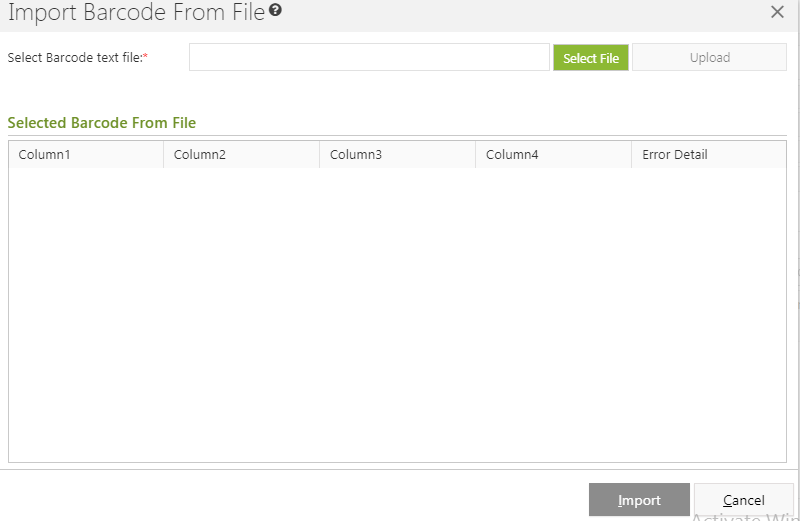
- Click on the Import File option.(Barcode text file (.TXT or .CSV) needs to be selected and uploaded).
- Columns can be mapped for Invoice No., Barcode, Quantity.
- Mapping of Invoice No. and Barcode columns is mandatory. Quantity mapping is optional.
- On successful import, Invoice wise items to be populated.
- Specific Invoice:
Click on the Calculate Charge button to calculate the charges:
Logic for Charge Population
Note:
- If the selected Delivery challan belong to single Sales Order, then
- Sales Term to be populated from Sales Order.
- Item level charge will get populated as specified in the Sales Order.
- Document level charge will get populated as specified in the Sales Order.
- If the selected Delivery challan belong to more than one Sales Order, then
- Sales Term to be retained as per default hierarchy from Destination site.
- Item level charge will get populated as selected Sales Term.
- Document level charge will get populated as selected Sales Term.
If the selected Delivery Challan are from Adhoc and single sales order, then
- Sales Term to be populated from Sales Order.
- Item level charge will get populated as specified in the Sales Term.
- Document level charge will get populated as specified in the Sales Term.
- If the selected Delivery challan belong to single Sales Order, then
- Others: You can put in the Remarks for the Sales Return in Others section.
- Click on the Save button to generate the Sales Return and you will get a message - "Document <Sales Return No.> saved successfully".
Prerequisites
- The users' role must have access to the Edit app operation in the Sales Return feature in Sales & Distribution - Operation - Invoicing through Roles in Ginesys Web - Admin - Security.
- Sales Return must be created and Un-posted.
Step-by-step guide
- Go to Ginesys Web > Sales and Distribution > Operations > Invoicing > Sales Return.
- Sales Return module will open.
- All the previously created Sales Return will be listed here.
- Select the Sales Return you want to edit.
- You can use Filter to search particular Sales Return(s).
- Go to Action > Edit.
- Sales Return window will open.
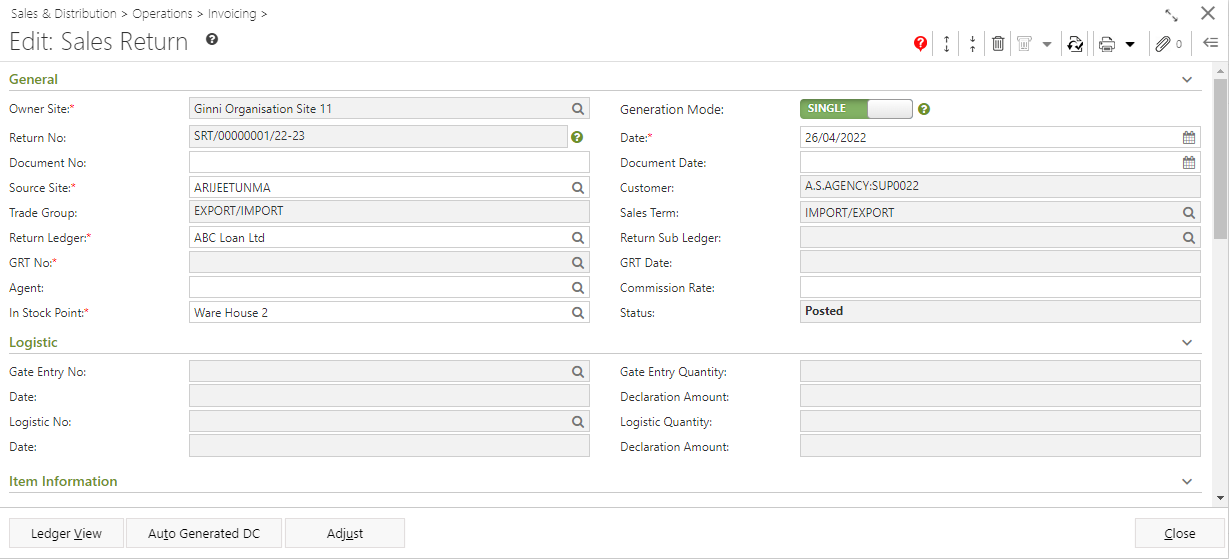
- If you want to edit the Destination Site, you will get a message - "Please remove the selected DC(s) before changing the destination site". After removing the DC(s) you can change Destination Site.
- You can add or remove Delivery Challan. Delivery challan modification does not depend on the modification of Destination Site.
- The items will be modified as per modification of Delivery Challan.
Click on the Save button to save the modified Sales Return.
Information

You will get Delete, Cancel and Release icon in the Edit mode with others icons at the top right corner of the window.
Delete: You can Delete the Sales Return from the Edit Mode by clicking on the Delete icon (
 ).
).Release: You can Release the Sales Return from the Edit Mode by clicking on the Release icon (
 ).
).Note: You will get a Ledger View button at the left bottom corner of the window. You will get the details ledger view of the Sales Return.
Prerequisites
- The users' role must have access to the Delete app operation in the Sales Return feature in Sales & Distribution - Operation - Invoicing through Roles in Ginesys Web - Admin - Security.
- Sales Return must be created and un-posted.
- Sales Return must not be released.
- Sales Return must not be cancelled.
Step-by-step guide
The steps are as follows:
- Go to Ginesys Web > Sales and Distribution > Operations > Invoicing > Sales Return.
- Sales Return module will open.
- All the previously created Sales Return will be listed here..
- Select the one Sales Return you want to delete.
- You can use Filter to search particular Sales Return(s).
- Go to Action > Delete.
- You will get a message - "Document once deleted cannot be retrieved. Do you want to delete this document?"
If you click on Yes, you will get a confirmation message "<Sales Return No:> - Successfully deleted".
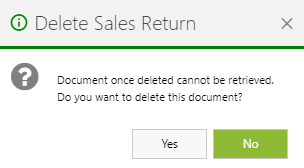
Note: If you want to delete a posted document, you will get a message - "Sales Return<Sales Return No:> - Cannot delete released document".
Prerequisites
- The users' role must have access to the Release app operation in the Sales Return feature in Sales & Distribution - Operation - Invoicing through Roles in Ginesys Web - Admin - Security.
- Sales Return must be created and un-posted.
- Sales Return must not be released.
- Sales Return must not be cancelled.
Step-by-step guide
The steps are as follows:
- Go to Ginesys Web > Sales and Distribution > Operations > Invoicing > Sales Return.
- Sales Return module will open.
- All the previously created Sales Return will be listed here..
- Select the one Sales Return you want to release.
- You can use Filter to search particular Sales Return(s).
- Go to Action > Release.
- You will get a message - "Document(s) once released cannot be modified. Do you want to proceed?"
- If you click on Yes, you will get a confirmation message " Return No <Sales Return No:> - Released Successfully".
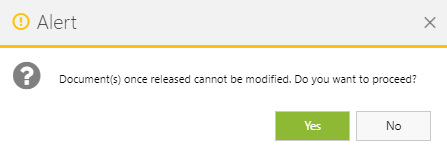
Prerequisites
- The users' role must have access to the Revert app operation in the Sales Return feature in Sales & Distribution - Operation - Invoicing through Roles in Ginesys Web - Admin - Security.
- Sales Return must be created and Posted
- Sales Return must be Released.
- Sales Return must not be Cancelled.
- The site must be Unmanaged site.
Step-by-step guide
The steps are as follows:
- Go to Ginesys Web > Sales and Distribution > Operations > Invoicing > Sales Return
- Sales Return module will open.
- All the previously created Sales Return will be listed here.
- Select the one Sales Return you want to release.
- You can use Filter to search particular Sales Return(s).
- Go to Action > Revert.
- You will get a message - "Selected document(s) will be un-posted, and finance postings done will also be reverted. Do you want to proceed?"
- If you click on Yes, you will get a confirmation message " Return No <Sales Return No:> - Reverted Successfully".

Prerequisites
- The users' role must have access to the Print app operation in the Sales Return feature in Sales & Distribution - Operation - Invoicing through Roles in Ginesys Web - Admin - Security.
- Sales Return must be created.
- Printer must be connected to the device.
Step-by-step guide
The steps are as follows:
- Go to Ginesys Web > Sales and Distribution > Operations > Invoicing > Sales Return.
- Sales Return module will open.
- All the previously created Sales Return will be listed here.
- Select the one Sales Return you want to release.
- You can use Filter to search particular Sales Return(s).
- Go to Action > Print.
- You will get previously created template.
- Click on the required template to print.
- A new window will open.
Click on the Print to print the Sales Return.
Note: You can set your preferred templates for printing using Print Preference.
Impact of Batch/Serial functionality on S&D: Sales Return
Changes in Item Grid
Three ew columns have been added in the Item details block of Item information section - Batch/Serial No., Mfg. Date and Valid Upto |
All column types are “View only”, i.e. modification is not allowed.
The columns are hidden by default but can be visible by the column chooser.
Values are displayed as populated from the various Item selection modes.
CHANGES When Source Site is Outright mode and Track Secondary
In ‘Add items window’
Three new columns have been added in the item details grid- Batch/Serial No., Mfg. Date and Valid Upto
All column types are “View only”, i.e. modification is not allowed.
The columns are hidden by default but can be visible by the column chooser.
Changes in column selection are retained in grid state.
Column behaviour: All items will get populated with batch/serial if applicable
Workflow:
From different population mode, user could either update the return quantity in the existing row in the grid or could add a new row if not exist in the grid
Population Mode behaviour:
On Scan item: (Set scan not applicable here as-is)
Behaviour of Scan item window will remain alike
Impact of Batch/Serial functionality on Scan Item
Function Name
ExplanationScan Item 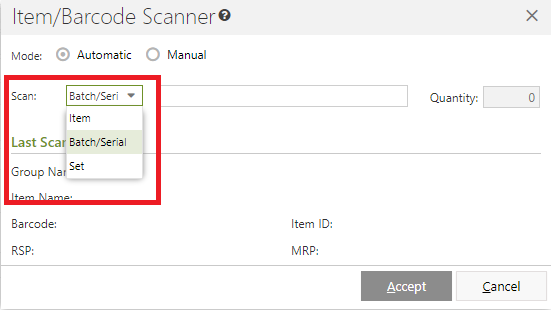
Pop up Details:
New addition in UI highlighted in red
- A new LOV has just been added before Item scan field, with following values - Item, Batch/Serial and Set
On selection of Item - Item Barcode (existing OEM Barcode/ICODE) or Batch/Serial wise Item Barcode (ICODE/OEM Barcode + Batch/Serial Information) will be accepted. - On selection of Batch/Serial - Only Batch/Serial Barcode (Batch/Serial Information) will be accepted.
On selection of Set - Only Set Barcode will be accepted and new window for Batch/Serial selection will open.
User is not allowed to scan (Batch/Serial) as “System batch/serial” in item scan window.
Msg: “System Batch/Serial is restricted.”[OK]Common behaviour on scanning of an item
System is checked for combination of I Code, Batch/Serial no., Rate & Parent document already present in the base form :
If found, then append the quantity on next scan.
Otherwise, a new row will be added in the base form.
Negative stock will be checked while scanning.
If applicable, negative stock alert message will include Batch/serial number also.
Impact of Batch/Serial functionality on last scan details
Two new columns have been added - Batch/Serial No. and Valid Upto
Existing columns present -
- Group Name (Existing),
- Item name (Existing)
- Barcode (Existing)
- Item id (Existing)
RSP Population Logic - For items having price management at batch/serial level RSP will be picked from Batch/Serial, otherwise from item level.
MRP Population Logic - For items having price management at batch/serial level MRP will be picked from Batch/Serial, otherwise from item level.
Note -
- For normal item scan where there is no batch/serial implication, there is no change in existing flow.
- This information would be shown only when single item/batch or item/serial combination is scanned/selected. Where multi item/batch or item/serial combination is scanned/selected, it is kept blank.
Item scanned/selected already exists in the grid
In batch/item/serial pop up window show only those details that are existing in the grid against the selected GRT. Further user can adhoc scan.
Item scanned/selected doesn’t exist in the grid
Batch/Serial/item pop up window will open blank in every case (Auto/ Manual)
Batch/Serial window not to display pending Qty. (as not applicable in case of return)
Suggestion: Try to show qty as GRT Qty. - Return Qty. for each batch/serial.
- A new LOV has just been added before Item scan field, with following values - Item, Batch/Serial and Set
On Select item:
Similar exceptions as provided in scan item.
Impact of Batch/Serial functionality on Select Item
Select Item User flow
User selects item(s) from the select item population mode, specify the qty(s) as per validations.
Click on 'Populate', in current scenario all items with qty >0 will get populated in the main item grid.
But now after introduction of batch/serial, a new window (Batch & Serial Selection window) will open for selection of batch/serial with items.
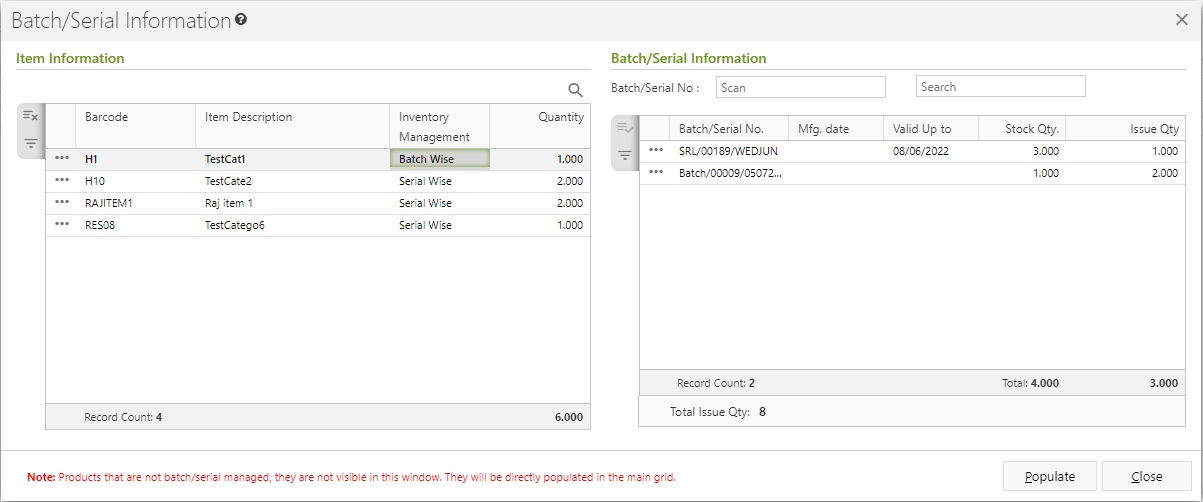
Expected U/X of the window -
On opening the window cursor would be on Item Information section grid - 1st row.
In Batch/Serial Information grid, display respective batch/serial data for selected ICODE
On tabbing from any row in Item Information grid, move the cursor to Batch/Serial Information grid - 1st row - Quantity section and highlight row in Item Information grid against which Batch/serial information is being displayed.
On pressing up/down arrow button, move cursor to above/below row -
Above/below row’s quantity section is case of batch managed items.
Above/below row in case of serial managed items.
On tabbing, move cursor to Populate button → Close
- Shift + TAB would take user back to previous field
- “Products that are not batch/serial managed will not be visible in this window. They will be directly populated in the main grid.”
On Import Barcode:
Behaviour of Import barcode window will remain alike
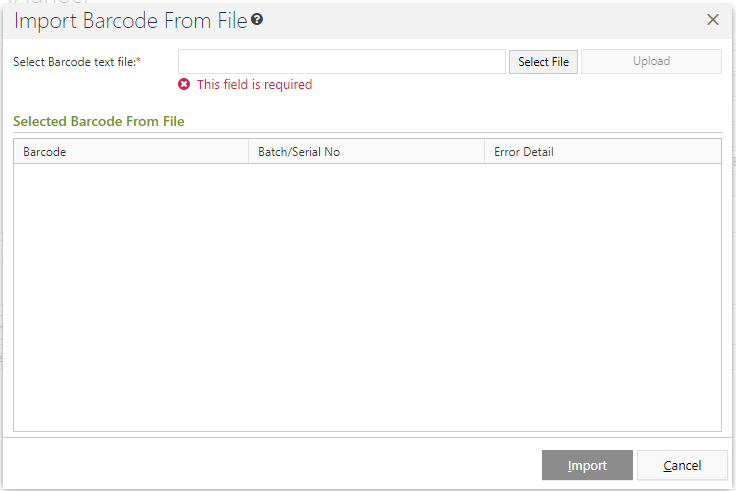
New column has been added in the grid - ”Batch/Serial No.”
Validations:
“Batch/Serial No.” is mandatory if inventory tracking is Batch/Serial wise.
Error Msg: ”Batch/Serial information for item not defined.”If inventory tracking of item is Item wise then, Batch/Serial information if given by user (either in batch/serial column or concatenated in Icode) won’t be accepted by system.
Error Msg: ”Batch/Serial information is not applicable for the item, Please delete batch/serial info and try again.”If Either Icode or Batch/Serial detail is mandatory, then user must provide at least one of the two values.
Error Msg: ”Both Icode and batch/serial fields cannot be blank.”Serial no. cannot be repeated for an item.
Error Msg: “Serial No. can’t be duplicate.”Item quantity for serial managed items must be equal to Scan Unit of that item.
Error Msg: “ITEM_QTY for serial managed items must be equal to scan unit of item.”Combination of Item Code + Batch/Serial no. must exist in system.
Error Msg: “Invalid Batch/Serial information.”If batch/serial number is already added to the icode/barcode, then there should be no value in Batch/serial No column.
Error Msg: ”Please remove value from batch/serial column and try again.”If Item code is not available and serial/batch is provided then system will restrict if multiple combinations for item code and serial/batch exist.
Error Msg: ”Multi combination exist for the given batch/serial. Specify the icode to proceed.”Important Alert
ICode+Batch/Serial barcode (i.e. concat barcode) is allowed to be imported from import barcode functionality.
This behaviour will prevail across whole Ginesys web for import barcode functionality.If ICODE is NULL and value is provided in batch/serial column then check for their correctness and then check if single row exist in the respective search result(s) then auto populate else throw an error. (Error msg given above in validation)
Short/Excess Receive Window
Three new columns have been added in the item details grid: Batch/Serial No., Mfg. Date and Valid Upto
All column types are “View only”, i.e. no modification is allowed.
It is hidden by default.
Changes in column selection are retained in grid state.
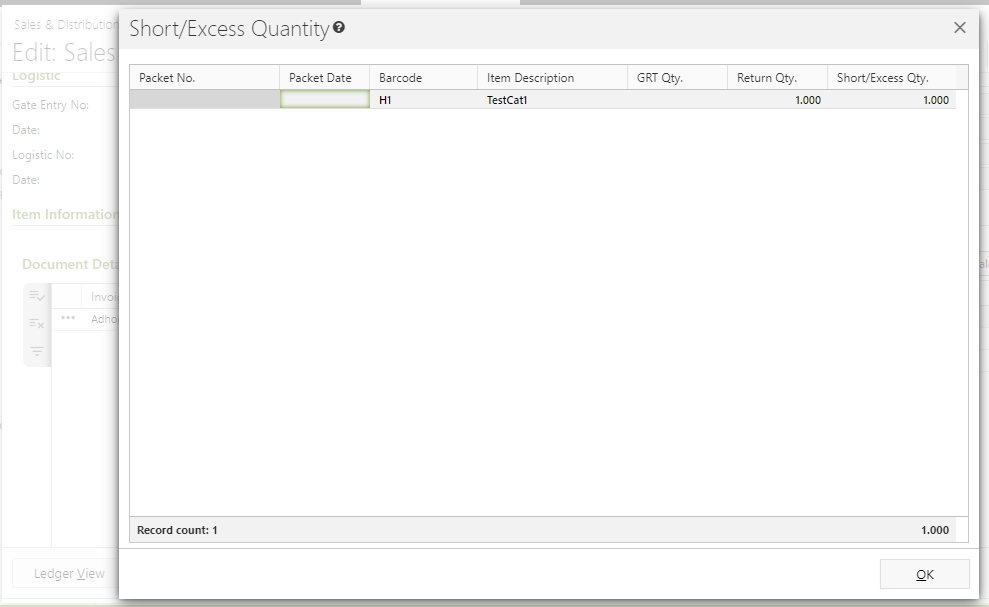
POPULATE BEHAVIOUR
Logic of populate remains as is, with the only change is system need to now consider batch/serial while resolving.
SOURCE SITE <> 'MS-CO-OM-TS' i.e ('US-CO-OM', ‘US-CO-OM-TS’)
Specific Invoice window
Three new columns have been added in the item details grid: Batch/Serial No., Mfg. Date and Valid Upto
All column types are “View only”, i.e. no modification is allowed.
It is hidden by default.
Changes in column selection are retained in grid state.
Column behaviour: All items will get populated with batch/serial if applicable
Workflow:
Select an invoice and populate all pending items
With Only exception Set scan is not allowed here.Set-off Invoice window
Three new columns have added in the window - Batch/Serial No., Mfg. Date and Valid Upto
All column types to be “View only”, i.e. modification is not allowed.
It is hidden by default.
Values will display as populated from the various Item selection modes.
Three options are there to select item(s) from various item selection modes - Scan item, Select Item and Import Barcode
Scan Item | Select Item:
Batch/Serial/item pop up window will open blank in every case (Auto/ Manual).
Adhoc Scan will be allowed in every case (for serial managed items also).
No negative stock check is there.
On adhoc scan : Check whether item & batch/serial combination exists in the system, otherwise the following error message will be shown - “Invalid batch/serial/item is scanned” [OK].
- Under Batch/Serial information grid, column for “Stock Qty.” and total count in grid footer for same is not needed.
- For batch managed items, “Issue Qty.” column will be renamed as “Receive Qty.”
- For serial managed items, sum of total of Scan Units of checked boxes is needed.
Import File
New column has been added in the Import Barcode from file: “Batch/Serial No.”
Note: Existing validation to remain as-is. Batch/serial will get included in grouping logic.
Point To Note
In case of auto DC generation, with item, batch/serial will also be considered.
Additional Check on SAVE
If any of the Serial managed Item has duplicate Serial number, the following message will be shown.
Message Display: "Duplicate Serial Information found for the Item <barcode>. unable to proceed" [OK]
For serial managed items, stock for Item + Serial combination should be 0/Null in the system, the following message will be shown.
Message Display: "Stock already exist for the selected item and serial combination, please rectify and try again." [OK]
For serial managed items, Qty. for Item + Serial combination should always be equal to scan unit, the following message will be shown.
Message Display: "Qty. for item is not matching with scan unit, please rectify and try again." [OK]
Note: Above validations should have grid level stop demarcation.